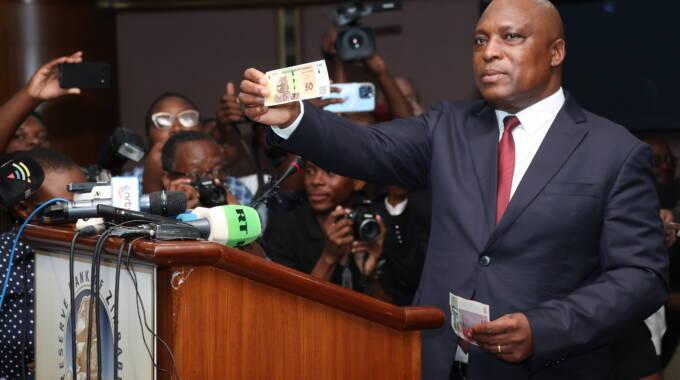Making ZiG fully convertible could lead to dollarisation
Reserve Bank of Zimbabwe (RBZ) Governor Dr John Mushayavanhu says making ZiG fully convertible for all local transactions will result in complete dollarisation of the economy as a weaker local currency cannot compete with a strong one such as the US dollar.
The central bank introduced a new currency, ZiG, on April 5 this year.
The authorities say ZiG is backed by US dollar cash reserves and precious minerals like gold. At launch, ZiG was backed by US$285 million, which authorities say is roughly three times the US$80 million worth of local currency currently in circulation.
Currency convertibility refers to the freedom to convert the domestic currency into another internationally recognised or accepted currencies or vise-versa at market determined rates of exchange.
Hence when a currency can be freely converted for another, it means businesses and investors have greater confidence that they can easily get their money in and out of a country.
However, according to www.slideshore.net factors affecting convertibility include the availability of foreign currency reserves in a given country and domestic regulations seeking to protect domestic investors from bad investment decisions in, say, a currency undergoing a period of hyperinflation.
Confidence in ZiG hinges on convertibility
While authorities are confident ZiG is the answer to exchange rate instability and inflation, critics disagree. They say the new currency will not hold its value unless it is freely convertible to US dollars, a development authorities say is not yet feasible.
Furthermore, its long-term viability is questioned because some transactions such as fuel and passport purchases, are exclusively done in foreign currency and fall outside formal banking channels requirements to access foreign currency.
Economic analyst, Farai Mutambanengwe, believes that if the RBZ and Ministry of Finance, Economic Development and Investment Promotion stick to their plan, “we should see stability in the ZiG exchange rate going forward, and possibly even an appreciation.”
He added; “However, for that to happen, they will need to either empower ZiG for all domestic transactions, including fuel and passports, or allow limited forex purchases from official markets. This would give people access to the forex needed for those dollar-only payments.”
“In its current form,” Mutambanengwe argued, “there is no mechanism linking the ZiG’s value/exchange rate to the reserves supposedly backing it.”
Economists criticise ZiG’s limited convertibility
On his social media handle, economist Professor Gift Mugano, called the government’s decision to allow exclusive US dollar use at fuel stations “a huge mistake.”
“Fuel stations are encouraged, not directed?” Mugano questioned. “This means ZiG cannot buy fuel? ZiG will not make it!”
Walter Mandeya, an analyst with Trigrams Investment, said by limiting convertibility, the RBZ has lost the confidence of a significant portion of the economy.
Mandeya acknowledged it is early to definitively assess ZiG, but “the signs suggest the market will reject a local currency that is not fully convertible.”
Guaranteed convertibility scheme proposed as alternative
The Confederation of Zimbabwe Industries (CZI), in its proposal to authorities, called for a scheme guaranteeing local currency convertibility.
Without suggesting a name change, CZI proposed a Guaranteed Convertibility Scheme as the key to overcoming fiscal challenges.
The business representative body believes a well-structured guaranteed convertibility scheme would create complete interchangeability between local currency earnings and foreign exchange, thereby protecting it from devaluation.
While the Guaranteed Convertibility Scheme was primarily proposed to limit government losses from ongoing devaluation and supplier price hedging, CZI believes its implementation “will guarantee a stable currency for the medium-term, putting years of currency instability behind us.”
“A guaranteed convertibility scheme maintains a fixed exchange rate by holding reserves of foreign currency, exactly matching the amount of transactable domestic currency at the fixed rate.
“This ensures that the domestic currency is always backed at the fixed rate, meaning that anyone holding domestic currency can, on demand, get foreign exchange at the fixed exchange rate,” reads part of CZI’s submission to authorities.
CZI’s scheme vs ZiG
Dr. Mushayavanhu acknowledged that ZiG heavily borrowed from CZI’s submissions. He said the World Bank was also consulted on ZiG’s development, and “a lot of the elements” of the structured currency “came from the World Bank.”
Responding to Business Weekly inquiries via Whatsapp, Dr. Mushayavanhu said the central bank considered CZI’s proposal before formulating the Monetary Policy Statement and “implemented most of their suggestions.”
However, he maintained that “making ZiG convertible for local transactions would result in full dollarisation of the economy.”
Dr Mushayavanhu believes a weaker currency cannot win against a strong one like the US dollar.
CZI, however, warned that “it is significantly worse to have a badly executed guaranteed convertibility scheme than to have none at all”.
They emphasised the need for broad public and financial institution understanding and support for the guaranteed convertibility scheme to function effectively.
However, Mandeya said while the RBZ borrowed heavily from the CZI’s submission, ZiG has been put forward as a structured currency and might not necessarily be CZI’s proposed guaranteed convertibility scheme.
Dr Mushayavanhu, when questioned about whether the US$80 million worth of ZiG is sufficient to meet export surrenders of approximately US$150 million, said this mismatch would strengthen ZiG as demand increases.
He explained that the central bank can always increase the amount of ZiG in circulation based on demand and reserve availability.
“As of now,” Dr. Mushayavanhu said, “we have enough reserves to increase the amount of ZiG in circulation threefold but are not doing that because ZiG has to be scarce for it to fulfill its role as a store of value”.-ebusinessweekly











